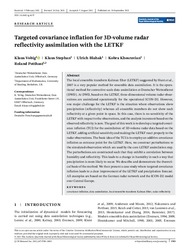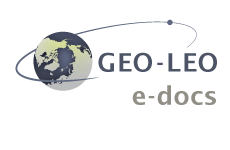Targeted covariance inflation for 3D‐volume radar reflectivity assimilation with the LETKF
DOI: https://doi.org/10.1002/qj.4157
Persistent URL: http://resolver.sub.uni-goettingen.de/purl?gldocs-11858/9831
Persistent URL: http://resolver.sub.uni-goettingen.de/purl?gldocs-11858/9831
Vobig, Klaus; Stephan, Klaus; Blahak, Ulrich; Khosravian, Kobra; Potthast, Roland, 2021: Targeted covariance inflation for 3D‐volume radar reflectivity assimilation with the LETKF. In: Quarterly Journal of the Royal Meteorological Society, Band 147, 740: 3789 - 3805, DOI: 10.1002/qj.4157.
 |
Dokument öffnen: |
The local ensemble transform Kalman filter (LETKF) suggested by Hunt et al., 2007 is a very popular method for ensemble data assimilation. It is the operational method for convective‐scale data assimilation at Deutscher Wetterdienst (DWD). At DWD, based on the LETKF, three‐dimensional volume radar observations are assimilated operationally for the operational ICON‐D2. However, one major challenge for the LETKF is the situation where observations show precipitation (reflectivity) whereas all ensemble members do not show such reflectivity at a given point in space. In this case, there is no sensitivity of the LETKF with respect to the observations, and the analysis increment based on the observed reflectivity is zero. The goal of this work is to develop a targeted covariance inflation (TCI) for the assimilation of 3D‐volume radar data based on the LETKF, adding artificial sensitivity and making the LETKF react properly to the radar observations. The basic idea of the TCI is to employ an additive covariance inflation as entrance point for the LETKF. Here, we construct perturbations to the simulated observation which are used by the core LETKF assimilation step. The perturbations are constructed such that they exhibit a correlation between humidity and reflectivity. This leads to a change in humidity in such a way that precipitation is more likely to occur. We describe and demonstrate the theoretical basis of the method. We then present a case study where targeted covariance inflation leads to a clear improvement of the LETKF and precipitation forecast. All examples are based on the German radar network and the ICON‐D2 model over Central Europe. The goal of this work is to develop a targeted covariance inflation (TCI) for the assimilation of 3D‐volume radar data based on the local ensemble transform Kalman filter (LETKF), adding artificial sensitivity and making the LETKF react properly to the radar observations. Perturbations to the simulated observations are constructed such that they exhibit an empirically derived correlation between humidity and reflectivity. This leads to a change in humidity in such a way that precipitation is more likely to occur.
Statistik:
ZugriffsstatistikSammlung:
Schlagworte:
covariance inflationdata assimilation
local ensemble transform Kalman filter
radar reflectivity
This is an open access article under the terms of the Creative Commons Attribution‐NonCommercial License, which permits use, distribution and reproduction in any medium, provided the original work is properly cited and is not used for commercial purposes.

